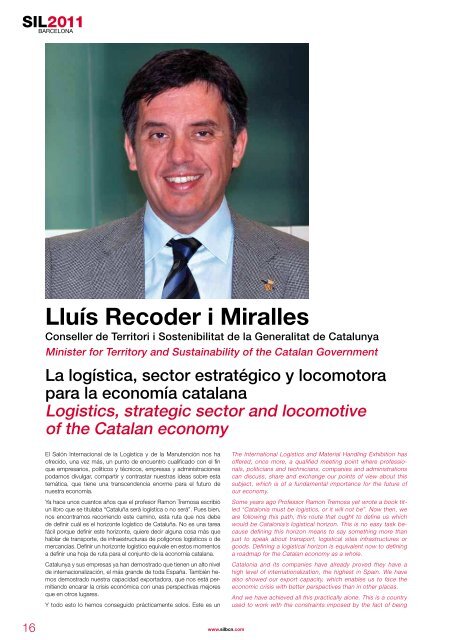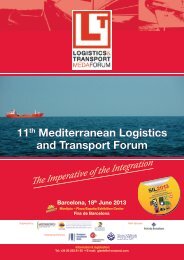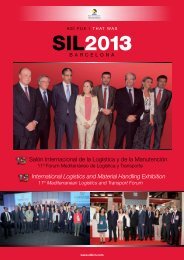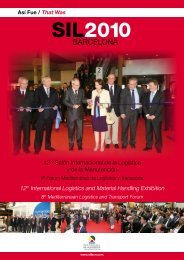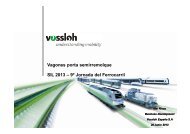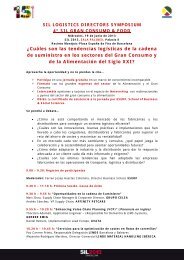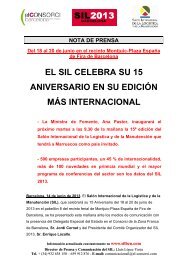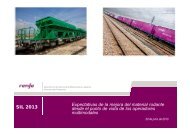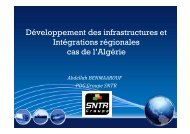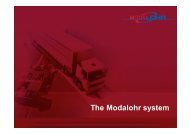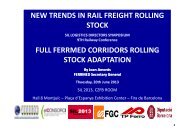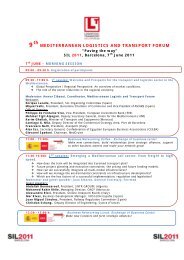descargar resumen sil 2011
descargar resumen sil 2011
descargar resumen sil 2011
Create successful ePaper yourself
Turn your PDF publications into a flip-book with our unique Google optimized e-Paper software.
Lluís Recoder i Miralles<br />
Conseller de Territori i Sostenibilitat de la Generalitat de Catalunya<br />
Minister for Territory and Sustainability of the Catalan Government<br />
La logística, sector estratégico y locomotora<br />
para la economía catalana<br />
Logistics, strategic sector and locomotive<br />
of the Catalan economy<br />
El Salón Internacional de la Logística y de la Manutención nos ha<br />
ofrecido, una vez más, un punto de encuentro cualificado con el fin<br />
que empresarios, políticos y técnicos, empresas y administraciones<br />
podamos divulgar, compartir y contrastar nuestras ideas sobre esta<br />
temática, que tiene una transcendencia enorme para el futuro de<br />
nuestra economía.<br />
Ya hace unos cuantos años que el profesor Ramon Tremosa escribió<br />
un libro que se titulaba “Cataluña será logística o no será”. Pues bien,<br />
nos encontramos recorriendo este camino, esta ruta que nos debe<br />
de definir cuál es el horizonte logístico de Cataluña. No es una tarea<br />
fácil porque definir este horizonte, quiere decir alguna cosa más que<br />
hablar de transporte, de infraestructuras de polígonos logísticos o de<br />
mercancías. Definir un horizonte logístico equivale en estos momentos<br />
a definir una hoja de ruta para el conjunto de la economía catalana.<br />
Catalunya y sus empresas ya han demostrado que tienen un alto nivel<br />
de internacionalización, el más grande de toda España. También hemos<br />
demostrado nuestra capacidad exportadora, que nos está permitiendo<br />
encarar la crisis económica con unas perspectivas mejores<br />
que en otros lugares.<br />
Y todo esto lo hemos conseguido prácticamente solos. Este es un<br />
The International Logistics and Material Handling Exhibition has<br />
offered, once more, a qualified meeting point where professionals,<br />
politicians and technicians, companies and administrations<br />
can discuss, share and exchange our points of view about this<br />
subject, which is of a fundamental importance for the future of<br />
our economy.<br />
Some years ago Professor Ramon Tremosa yet wrote a book titled<br />
“Catalonia must be logistics, or it will not be”. Now then, we<br />
are following this path, this route that ought to define us which<br />
would be Catalonia’s logistical horizon. This is no easy task because<br />
defining this horizon means to say something more than<br />
just to speak about transport, logistical sites infrastructures or<br />
goods. Defining a logistical horizon is equivalent now to defining<br />
a roadmap for the Catalan economy as a whole.<br />
Catalonia and its companies have already proved they have a<br />
high level of internationalization, the highest in Spain. We have<br />
also showed our export capacity, which enables us to face the<br />
economic crisis with better perspectives than in other places.<br />
And we have achieved all this practically alone. This is a country<br />
used to work with the constraints imposed by the fact of being<br />
país que se ha acostumbrado a trabajar con las dificultades que supone<br />
estar en la periferia de un estado, que demasiadas veces deja<br />
escapar oportunidades únicamente por el hecho de que no pasan<br />
por el centro, que no pasan por Madrid. Esto seguramente nos ha<br />
hecho ser más fuertes y estar más preparados para afrontar retos<br />
como el que nos plantea este inicio del siglo XXI.<br />
Pero esto también está siendo un obstáculo en un momento como<br />
el actual, en que es más necesario que nunca tener claros cuáles<br />
son nuestros objetivos y cómo tenemos que llegar a ellos. Hablo por<br />
ejemplo del Corredor Mediterráneo. Cuánta energía hemos tenido<br />
que gastar desde Cataluña para justificar la necesidad de construir el<br />
Corredor ferroviario de mercancías del Mediterráneo.<br />
Un eje que, permítanme la simplificación, prácticamente se justifica<br />
solo porqué es la vía más corta, más rápida y más barata de conectar<br />
el Mediterráneo Occidental y España entera con el Centro y el Norte<br />
de Europa. Sin embargo nos ha hecho falta gastar muchos esfuerzos<br />
en hacer una pedagogía, que aunque ha sido muy útil, no nos ha<br />
permitido hasta ahora ir más allá de trazar una línea sobre un mapa.<br />
Cuando en Cataluña hablamos del Corredor Mediterráneo no nos<br />
referimos sólo a una vía de tren, a un trazado sobre un mapa. Estamos<br />
hablando de un gran proyecto de país que, lógicamente, tiene<br />
en sus raíces un nuevo modelo de infraestructuras. Un modelo que,<br />
obligatoriamente, nos lleva a romper con la radialidad de la estructura<br />
centralizada que ha impuesto el Estado en los tres últimos siglos. Un<br />
modelo que apuesta por la internacionalidad. Un modelo que comporta<br />
un cambio sustancial en la planificación, en la ejecución y en la<br />
gestión de los proyectos.<br />
Un modelo que no puede ni debe quedarse en las infraestructuras,<br />
que son una razón necesaria para el desarrollo, pero no una razón<br />
suficiente. Un modelo que, como decía, es un cambio de concepción<br />
del país y en el que la logística forma parte de la esencia. Es en este<br />
sentido que, por ejemplo, valoro muy positivamente, el protocolo que<br />
firmamos en el marco del SIL con el ministro Blanco para impulsar<br />
las terminales logísticas intermodales. Celebro que el Ministerio se dé<br />
cuenta de la importancia de apostar por la conexión del ferrocarril de<br />
mercancías con ancho internacional con los puertos.<br />
La estrategia de crecimiento del Port de Barcelona, y también del de<br />
Tarragona, sólo la podemos aprovechar si tenemos detrás un país<br />
preparado para gestionar un gran volumen de mercancías y dispuesto<br />
a sacar valor añadido. Tenemos una posición geográfica privilegiada,<br />
tenemos empresas cualificadas y con voluntad de invertir, pero<br />
nos hace falta que los gobiernos nos pongamos manos a la obra.<br />
En este sentido no puedo dejar de recordar a los responsables del<br />
Ministerio de Fomento y, muy concretamente, al ministro Blanco la<br />
necesidad que tenemos de garantizar la construcción de los nuevos<br />
accesos ferroviarios del Port de Barcelona. Todas las personas interesadas<br />
en la logística sabemos de la importancia y urgencia del Port.<br />
Hemos conseguido que inversores privados, nacionales y extranjeros,<br />
inviertan importantes cantidades en nuevas terminales, pero esto<br />
no servirá de nada si no garantizamos la construcción de una anilla<br />
de doble vía electrificada y con ancho europeo para agilizar el movimiento<br />
de mercancías durante los próximos años. Es una obra costosa<br />
pero imprescindible en los tiempos que corren por el innegable<br />
retorno económico y social que comporta, en forma de creación de<br />
ocupación y de generación de riqueza.<br />
Pero hasta incluso haciendo esta obra, corremos el riesgo de llegar<br />
tarde para complementar las inversiones que algunas de estas empresas<br />
han hecho en el Port de Barcelona. Es necesario que el Ministerio<br />
licite, adjudique y ejecute las obras en el mínimo tiempo posible<br />
para garantizar que a medio plazo el Port pueda conseguir los niveles<br />
de crecimiento previstos.<br />
Pero también es preciso hacer actuaciones rápidas y que permitan<br />
el acceso del ferrocarril de ancho europeo a la zona sur del Port de<br />
Barcelona. En este sentido ya puedo anunciar que juntamente con el<br />
Port estamos estudiando una solución de urgencia para conectar el<br />
Moll Prat antes de finalizar el 2012.<br />
Es un ejemplo de una pequeña actuación que puede generar un retorno<br />
económico de forma inmediata, un ejemplo de hacía dónde<br />
debemos enfocar nuestras actuaciones en los próximos años. Y un<br />
ejemplo de cómo recuperar el tiempo perdido para hacer que la logística<br />
se convierta en un sector estratégico y se convierta en la locomotora<br />
que la economía catalana necesita.<br />
on the periphery of a state that many times misses opportunities<br />
just because they do not pass though the centre, because they<br />
do not pass through Madrid. And this may have made us stronger<br />
and more prepared for responding to the challenges facing us in<br />
this beginning of the 21 st century.<br />
But it is also being an obstacle in a moment as the current one<br />
in which it is more necessary than ever to have clear objectives<br />
and to know how to reach them. I mean, for example, the Mediterranean<br />
Corridor. How much energy Catalonia has to spend to<br />
justify the need of building the Mediterranean corridor for goods.<br />
Un axis that, and please excuse the simplification, it is practically<br />
justified by the fact of being the shortest, quickest and cheapest<br />
way to connect Western Mediterranean and the whole Spain with<br />
Central and Northern Europe. However, many efforts have been<br />
wasted to making a pedagogy which, despite of being very useful,<br />
has not allowed us to go further than drawing a line in a map.<br />
When in Catalonia we talk about the Mediterranean Corridor, we<br />
do not mean just a railway track or a layout in a map. We are talking<br />
about a great country project which, logically, has its roots<br />
in a new infrastructures model. A model that therefore means a<br />
breach with the radial centralized structure imposed by the state<br />
over the past three centuries. A model that bets for internationality.<br />
A model that implies a substantial change in projects planning,<br />
implementation and management.<br />
A model that neither can nor ought to remain on the infrastructures<br />
level, which is a necessary reason for development, but not<br />
just the reason. A model which, as I was saying, means a change<br />
in the vision of the country and in which logistics is a part of the<br />
substance. In this regard, I very much appreciate, for example,<br />
the protocol signed with Minister Blanco within the framework of<br />
SIL for fostering intermodal logistics terminals. I do celebrate that<br />
Minister realize the importance of betting for the connection between<br />
rail freight with international width tracks and ports.<br />
The growth strategy of Port of Barcelona, and Port of Tarragona<br />
as well, can only be exploited if we have a country behind prepared<br />
for handling a great volume of goods and ready for getting<br />
added value out of it. We have a privileged geographical position<br />
and qualified companies willing to invest, but we need that governments<br />
get down to business.<br />
To this respect, I must remind to the officers of the Ministry of<br />
Development, and very specifically, to Minister Blanco, the need<br />
of guaranteeing the construction of the Port of Barcelona new railway.<br />
Every person interested in logistics knows about the importance<br />
and urgency of the Port. We have achieved that private investors,<br />
national and international, invest important sums in new<br />
terminals but all that will be useless if we do not guarantee the<br />
construction of the electrified double-track ring with international<br />
width track in order to speed up the goods movement during the<br />
next years. It is an expensive work but essential nowadays due to<br />
the undeniable economic and social return, into employment and<br />
wealth creation.<br />
But even making this work, we risk to be late for completing the<br />
planned investments that some of these companies have already<br />
made in the Port of Barcelona. It is necessary that the Ministry<br />
call for tenders, award and execute works on the shortest possible<br />
time so as to guarantee that the Port can reach the growth<br />
targeted levels in the medium-term.<br />
All the same, quick actions are required in order to allow the European<br />
width track railway access to southern area of the Port<br />
of Barcelona. In this sense, I can now announce that, together<br />
with the Port of Barcelona, we are studying an urgent solution for<br />
connecting the Prat Dock before the end of 2012.<br />
This is just an example of a small action that can generate an<br />
immediate economic return, an example of where we shall focus<br />
our performances over the next years. And an example of how<br />
to make up for lost time so as logistics turn up to be a strategic<br />
sector and the locomotive that Catalan economy needs.<br />
16 17


